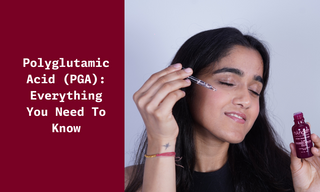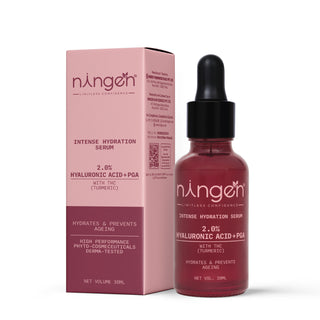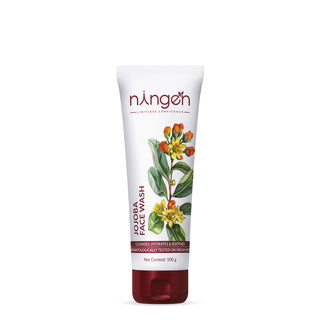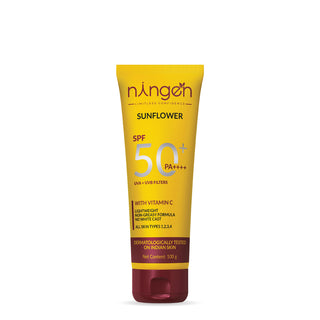Polyglutamic Acid (PGA) has caught the attention of researchers, skincare enthusiasts, and industry professionals. It's a natural material made up of repeated units of glutamic acid, and it's being explored in various scientific and business fields. From where it comes from to its special properties, PGA is versatile and full of potential.
In this exploration, we'll dive into the world of Polyglutamic Acid, learning about its origins and unique qualities. We'll see how it's being used in skincare, medicine, and more. PGA is changing the game, from transforming skincare routines to being considered for advanced medical technologies. Get ready to discover all about Polyglutamic Acid, its interesting features, and how it's making waves in science, beauty, and innovation.
What is Polyglutamic Acid (PGA)?
Polyglutamic Acid (PGA) is a natural substance made from repeating parts of an amino acid called glutamic acid. It is a water-soluble polymer and is produced by bacteria through fermentation.
It is good for many things, like making skin products and medicine. In skin care, PGA helps keep the skin hydrated and elastic. It can also be used in medicine to heal wounds and deliver drugs safely.
PGA is friendly to the environment because it dissolves in water and breaks down naturally. Overall, Polyglutamic Acid is a useful and versatile material for beauty and health.

The Science Behind Polyglutamic Acid
Polyglutamic acid (PGA) is a naturally occurring biopolymer that holds immense potential in various fields, including skincare and medicine. Its unique properties have caught the attention of scientists and researchers, leading to a growing interest in understanding the science behind this remarkable substance.
PGA is a polymer of the amino acid glutamic acid, which is a component of protein. It is biodegradable, non-toxic, and water-soluble, making it an appealing choice for a wide range of applications. In skincare, PGA has gained attention for its exceptional moisturizing properties and its ability to enhance the skin's natural barrier function. Its water-retaining capabilities are even more impressive than that of hyaluronic acid, another popular skincare ingredient.

PGA benefits for skin
- PGA, or Polyglutamic Acid, is a natural moisturizer that helps to hydrate the skin. It can hold moisture up to 10 times more than hyaluronic acid, making it an excellent ingredient for moisturizing dry skin.
- It has a lightweight texture and is easily absorbed into the skin, leaving it feeling smooth and refreshed. It does not leave a greasy or sticky residue, making it suitable for all skin types.
- This ingredient promotes collagen production, helping to improve the elasticity and firmness of the skin. Regular use of PGA can help reduce the appearance of fine lines and wrinkles, resulting in a more youthful-looking complexion.
- It has antioxidant properties that help protect the skin from environmental stressors such as pollution and UV radiation. It neutralizes free radicals, preventing oxidative damage and reducing the signs of aging.
- It is gentle on sensitive skin and does not cause irritation or allergic reactions. PGA is suitable for those with sensitive or reactive skin, as it is derived from a natural source and is non-irritating.
- PGA has a soothing effect on the skin and can help reduce redness and inflammation. It is beneficial for those with acne-prone or rosacea-prone skin, as it helps to calm and balance the skin.
- This ingredient helps to improve the overall texture and tone of the skin, leaving it looking smoother, brighter, and more radiant. It can help reduce the appearance of dark spots, hyperpigmentation, and uneven skin tone.
- It has a barrier-enhancing effect on the skin, helping to strengthen the skin's natural protective barrier. This can help prevent moisture loss and protect the skin from external aggressors, such as harsh weather conditions and pollution.
- It is compatible with other skincare ingredients and can be easily incorporated into existing skincare routines. PGA can be used in combination with other moisturizers, serums, or creams to enhance their effectiveness and provide additional hydration.
- PGA is a sustainable and eco-friendly ingredient, as it is derived from fermented soybeans. It is biodegradable and does not harm the environment. Using skincare products that contain PGA supports sustainable and environmentally friendly practices.
When to start using PGA in your skincare routine?
Polyglutamic Acid (PGA) can be introduced into your skincare routine at various stages depending on your individual needs and concerns. Here are some general guidelines:
Early Prevention (20s):
- If you're in your 20s and looking to establish a proactive skincare routine, PGA can be included for its hydrating and preventive properties. It helps maintain skin elasticity and moisture levels.
Fine Lines and Early Signs of Aging (Late 20s to 30s):
- As you enter your late 20s or 30s and begin to notice fine lines or early signs of aging, incorporating PGA can help address these concerns. It enhances hydration and supports collagen production.
For Dry or Mature Skin (40s and Beyond):
- If you have dry skin or are dealing with more mature skin concerns, PGA can be particularly beneficial. It provides intense hydration, aiding in plumping and revitalizing the skin.
Alongside Other Actives:
- PGA can be used alongside other active ingredients like retinol or vitamin C, depending on your skincare goals. However, it's essential to introduce one new ingredient at a time and observe how your skin reacts.
All Ages for Hydration:
- PGA's excellent hydrating properties make it suitable for all ages. Even if you don't have specific aging concerns, you can use PGA to enhance overall skin hydration and health.
Note: If you want to know how to reduce dryness on your face, click on the link.
How to use polyglutamic acid in your skincare routine?
Incorporating PGA into your skincare routine is simple and can be done with the following steps:
Cleanse Your Face:
- Begin by cleansing your face using a gentle cleanser to remove any makeup, dirt, or impurities.
Tone (Optional):
- If you use a toner in your routine, apply it after cleansing to prepare your skin for the subsequent products.
Apply Polyglutamic Acid Serum:
- Use a Polyglutamic Acid serum. Apply a small amount to your face and neck, gently patting it onto your skin. PGA works well with other serums and moisturizers.
Follow with Other Skincare Products:
- If you have other serums or treatments in your routine, apply them after the Polyglutamic Acid serum.
Moisturize:
- Follow up with your favorite moisturizer to lock in hydration. PGA enhances the moisturizing effect.
Sunscreen (Morning Routine):
- In the morning, finish with a broad-spectrum sunscreen. PGA doesn't replace sunscreen but complements it well.
Pro Tips:
- PGA can be used both in the morning and evening.
- Start with a patch test to ensure compatibility with your skin.
- Follow product instructions regarding frequency and application.
Remember, consistency is key. Introduce PGA gradually into your routine to observe how your skin responds, and enjoy the benefits of enhanced hydration and improved skin elasticity over time.
Growing Popularity of Polyglutamic Acid
PGA has experienced a surge in popularity within the skincare industry, captivating the attention of beauty enthusiasts, skincare professionals, and researchers alike. The rising acclaim for PGA can be attributed to several key factors:
Exceptional Hydration Properties:
- PGA is renowned for its remarkable water-retaining abilities, surpassing even hyaluronic acid. This superior hydration capability makes it a sought-after ingredient in moisturizers and serums, addressing one of the fundamental needs of skincare – maintaining skin hydration.
Enhanced Skin Elasticity:
- The ability of PGA to boost collagen and elastin synthesis contributes to improved skin elasticity. This feature has propelled its popularity among those seeking solutions for maintaining firm and supple skin, especially as part of anti-aging skincare routines.
Versatility in Skincare Formulations:
- Skincare brands are increasingly incorporating PGA into a variety of formulations, from serums and moisturizers to masks and other treatment products. This versatility allows consumers to choose products that cater to their specific skincare concerns.
Compatibility with Other Ingredients:
- PGA harmoniously complements other skincare ingredients. Its compatibility with actives like retinol, vitamin C, and peptides makes it a valuable addition to comprehensive skincare routines, enhancing the overall efficacy of products.
Eco-Friendly and Biodegradable:
- Derived from natural sources, PGA is biodegradable, aligning with the growing demand for sustainable and environmentally friendly beauty products. The eco-conscious consumer base has contributed to PGA's popularity as an ethical choice in skincare.
Positive Consumer Experiences:
- Users of skin care products containing PGA often report positive experiences, noting improvements in skin texture, hydration, and overall appearance. Word-of-mouth endorsements and positive reviews on PGA-infused products have further fueled its popularity.
Innovation in Anti-Aging Solutions:
- PGA has emerged as a key player in the realm of anti-aging skincare. Its ability to address multiple signs of aging, coupled with its compatibility with other potent activities, positions it as a revolutionary ingredient in the quest for youthful and radiant skin.
Research and Development Advancements:
- Ongoing research into PGA's properties and potential applications, both in skincare and beyond, has contributed to its increasing popularity. As more scientific insights emerge, PGA continues to captivate the interest of researchers exploring its diverse benefits.
The rising popularity of Polyglutamic Acid signifies a paradigm shift in skincare preferences, with consumers seeking effective, versatile, and sustainable solutions. As beauty enthusiasts continue to embrace the benefits of PGA, it is likely to remain a prominent and influential ingredient in the ever-evolving landscape of skincare.
The Safety Profile of Polyglutamic Acid
Polyglutamic Acid (PGA) has demonstrated a generally favorable safety profile in skin care applications. Here are key points regarding the safety of PGA:
Derived from Natural Sources:
- PGA is often derived from natural sources, such as fermented soybeans. Being a naturally occurring biopolymer, it is generally considered safe for use in skincare products.
Biocompatibility:
- PGA exhibits excellent biocompatibility, meaning it is well-tolerated by the skin. This characteristic makes it suitable for a wide range of skin types, including sensitive skin.
Non-Irritating:
- PGA is known for being non-irritating. It is a gentle ingredient that does not typically cause adverse reactions, making it suitable for individuals with sensitive skin conditions.
Hypoallergenic:
- Due to its hypoallergenic nature, PGA is less likely to trigger allergic reactions. This quality is advantageous for those who may be prone to skin sensitivities.
Non-toxic and Biodegradable:
- PGA is non-toxic and biodegradable, contributing to its environmentally friendly profile. This aligns with the increasing demand for sustainable and eco-conscious skincare options.
No Known Contraindications:
- As of the last available information, there are no well-documented contraindications associated with the use of PGA in skincare. However, it's advisable to follow product-specific instructions and conduct patch tests to ensure individual compatibility.
Compatibility with Other Ingredients:
- PGA is often compatible with a variety of skincare ingredients, allowing it to be seamlessly integrated into formulations with other actives. This compatibility enhances its versatility in skincare products.
Dermatologist-Tested Products:
- Skincare products containing PGA are often subjected to dermatological testing to ensure safety and efficacy. Choosing products from reputable brands that prioritize rigorous testing can provide an added level of confidence.
Despite the positive safety profile of PGA, individual responses to skincare ingredients can vary. It is advisable to conduct a patch test before widespread use, especially for those with highly sensitive skin or a history of allergies. If any signs of irritation or adverse reactions occur, discontinuing use is recommended, and consulting with a dermatologist is advisable.
What is the difference between Polyglutamic acid & Hyaluronic acid?
Polyglutamic Acid (PGA) and Hyaluronic Acid (HA) are both ingredients used in skincare, but they have some differences. Let's break it down in simple terms:
- What They Are:
- PGA: It's a substance made from repeating parts of an amino acid called glutamic acid.
- HA: It's a substance naturally found in our skin and joints.
- Where They Come From:
- PGA: Often derived from natural sources like fermented soybeans.
- HA: Naturally present in our bodies and can be sourced from rooster combs or synthesized for skincare use.
- How They Work:
- PGA: Holds onto water, keeping your skin hydrated. It forms a protective layer.
- HA: Attracts and retains water, providing hydration and plumping the skin.
- Hydration Power:
- PGA: Known for superior hydration, even more than HA.
- HA: Well-known for its excellent hydration properties.
- Texture on the Skin:
- PGA: Often described as smoother on the skin.
- HA: Can have a slightly thicker or more gel-like feel.
- Skin Benefits:
- PGA: Improves skin elasticity, helps with fine lines, and suits various skin types.
- HA: Hydrates, reduces the appearance of wrinkles, and is widely used in skincare.
- Environmental Impact:
- PGA: Biodegradable and considered environmentally friendly.
- HA: Generally safe, but its sourcing can sometimes raise ethical and environmental concerns.
- Compatibility with Other Ingredients:
- PGA: Works well with different skincare ingredients.
- HA: Often used in combination with various skincare actives.
In summary, both PGA and HA are great for hydrating the skin, but PGA is known for its exceptional hydration power. They can complement each other and are used in various skincare products, so choosing between them might depend on your specific skin needs and preferences.
Note: Know more about Hyaluronic acid and its benefits in skin dryness here.
Wrapping Up
Polyglutamic Acid (PGA) emerges as a skincare revelation, stealing the spotlight with its exceptional hydrating prowess and versatile applications. Originating from natural sources, PGA's molecular structure and compatibility with various skin types make it a standout ingredient. Its ability to enhance elasticity, form a protective shield, and complement other skincare elements showcases its transformative potential. As an eco-friendly and biodegradable solution, PGA aligns seamlessly with sustainability trends. Whether seeking anti-aging solutions or profound hydration, PGA's multifaceted benefits position it as a skincare essential, promising a radiant and resilient complexion for those embracing the forefront of beauty innovation.
Discover our curated picks for effective products tailored to those with PGA in the recommended section below
Frequently Asked Questions
Question 1: What is Polyglutamic Acid (PGA) and why is it used in skincare?
Answer: PGA is a biopolymer derived from glutamic acid. It's used in skincare for its superior hydrating properties, promoting moisture retention and skin elasticity.
Question 2: How does Polyglutamic Acid differ from hyaluronic acid?
Answer: While both hydrates, PGA's water-retaining capacity surpasses hyaluronic acid, making it highly effective in maintaining skin moisture.
Question 3: Can PGA be used on sensitive skin?
Answer: Yes, PGA is generally well-tolerated and suitable for various skin types, including sensitive skin.
Question 4: Does Polyglutamic Acid help with anti-aging concerns?
Answer: Absolutely. PGA supports collagen synthesis, improving skin elasticity and diminishing the appearance of fine lines and wrinkles.
Question 5: How should PGA be incorporated into a skincare routine?
Answer: Apply PGA serum or moisturizer after cleansing and before heavier products. It complements other skincare ingredients.
Question 6: Can PGA be used alongside retinol or vitamin C?
Answer: Yes, PGA is compatible with various skincare actives and can be safely incorporated into a routine with retinol or vitamin C.
Question 7: Are there any side effects associated with PGA in skincare?
Answer: PGA is generally non-irritating, but it's advisable to conduct a patch test to ensure individual compatibility.
Question 8: What is the optimal concentration of PGA in skincare products?
Answer: Effective concentrations vary, but products typically contain between 0.5% to 5% PGA for noticeable benefits.
Question 9: Is PGA safe during pregnancy or breastfeeding?
Answer: While there's no specific data, PGA is generally considered safe. However, it's advisable to consult with a healthcare professional.
Question 10: Is Polyglutamic Acid environmentally friendly?
Answer: Yes, PGA is biodegradable, aligning with eco-conscious skincare trends. Its natural sourcing contributes to its sustainability.










